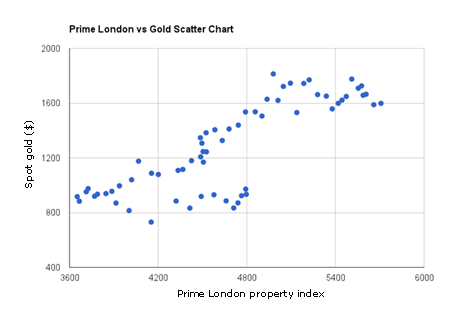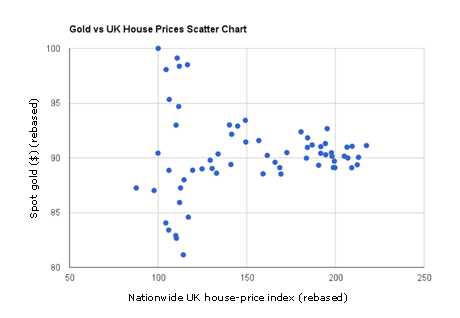London house prices: this could finally be it
House prices in central London have so far stubbonly refused to bow to the pressures of the financial crisis. But that could all be about to change.

Get the latest financial news, insights and expert analysis from our award-winning MoneyWeek team, to help you understand what really matters when it comes to your finances.
You are now subscribed
Your newsletter sign-up was successful
Want to add more newsletters?

Twice daily
MoneyWeek
Get the latest financial news, insights and expert analysis from our award-winning MoneyWeek team, to help you understand what really matters when it comes to your finances.

Four times a week
Look After My Bills
Sign up to our free money-saving newsletter, filled with the latest news and expert advice to help you find the best tips and deals for managing your bills. Start saving today!
One of the things I have been completely, utterly, totally wrong on over the lastfour to fiveyears has been the price of London property.
When the financial crisis kicked in, I was convinced that property prices across the UK would go down all at once. Definitely 20%; probably a lot more. Look at nominal prices and you will see that has happened to a degree. In Northern Ireland, prices are down over 50%, but most other places are only down 15% or so.
Look at it in real terms (taking inflation into account) and rather more carnage is clear. Scotland is down 27%, Yorkshire 29% and the South West as a whole is down24% (I put all the numbers on this into a chart for an episode of MWTV a few weeks ago).
MoneyWeek
Subscribe to MoneyWeek today and get your first six magazine issues absolutely FREE

Sign up to Money Morning
Don't miss the latest investment and personal finances news, market analysis, plus money-saving tips with our free twice-daily newsletter
Don't miss the latest investment and personal finances news, market analysis, plus money-saving tips with our free twice-daily newsletter
However, London is a different matter. Most of the country has made an excellent start on the path to price normalisation. But in London, prices in nominal terms have barely budged, while in real terms, they have fallen only 15% or so. And to add insult to injury, in prime central London (PCL) they have risen horribly fast.
The latest figures out from John D Wood show that the prices of PCL houses are up 6% in the last year alone and those of flats up over 20%.
We all know why we were wrong on PCL. We failed to anticipate just how much of a safe haven London would look relative to pretty much everywhere else in the world once therolling crisis started to hit Europe.
We also failed to see just how attractive it would look to the Russians and the Chinese looking to stash a little cash somewhere cheap (remember the only holding cost of a London house for a non-resident non dom is council tax), where their own rather nosier authorities might not notice it.
And finally, while we spotted the fact that the pound was likely to weaken, we didn't extrapolate that quite far enough to see that a falling currency would make London's houses look like an even better store of value to the rest of the world.
What is really irritating about all this, however, is that, had I checked the way in which PCL prices interact with the price of one of our more trusted assets gold I might never have made this maddening mistake. Look at the chart below.

Turns out that gold and PCL property move in much the same way there's a very clear correlation. Gold and PCL prices go up together and down together. Look at the second chart and you will see that isn't the case for UK property as a whole.

The international community considers lateral conversions in Kensington to be a globally safe real asset in times of trouble. It thinks the same of gold. It doesn't give a stuff for family houses in Liverpool.
So here's the interesting bit: the price of gold has just plummeted (we are still holding it for insurance purposes and we can't imagine looking back in ten years and considering that a bad idea see John Stepek's take on it here), but if gold prices are falling, does that mean London house prices finally will too? There would, at least, be some small consolation in that.
I know this blog postraises rather more questions than it answers (which is perhaps rather the point of blogs). In the next few weeks, John and I will be getting together with James Ferguson to talk about UK house prices in general and where we think they will go from here.
Get the latest financial news, insights and expert analysis from our award-winning MoneyWeek team, to help you understand what really matters when it comes to your finances.

-
 Can mining stocks deliver golden gains?
Can mining stocks deliver golden gains?With gold and silver prices having outperformed the stock markets last year, mining stocks can be an effective, if volatile, means of gaining exposure
-
 8 ways the ‘sandwich generation’ can protect wealth
8 ways the ‘sandwich generation’ can protect wealthPeople squeezed between caring for ageing parents and adult children or younger grandchildren – known as the ‘sandwich generation’ – are at risk of neglecting their own financial planning. Here’s how to protect yourself and your loved ones’ wealth.
-
 House prices to crash? Your house may still be making you money, but not for much longer
House prices to crash? Your house may still be making you money, but not for much longerOpinion If you’re relying on your property to fund your pension, you may have to think again. But, says Merryn Somerset Webb, if house prices start to fall there may be a silver lining.
-
 Prepare your portfolio for recession
Prepare your portfolio for recessionOpinion A recession is looking increasingly likely. Add in a bear market and soaring inflation, and things are going to get very complicated for investors, says Merryn Somerset Webb.
-
 Investing for income? Here are six investment trusts to buy now
Investing for income? Here are six investment trusts to buy nowOpinion For many savers and investors, income is getting hard to find. But it's not impossible to find, says Merryn Somerset Webb. Here, she picks six investment trusts that are currently yielding more than 4%.
-
 Stories are great – but investors should stick to reality
Stories are great – but investors should stick to realityOpinion Everybody loves a story – and investors are no exception. But it’s easy to get carried away, says Merryn Somerset Webb, and forget the underlying truth of the market.
-
 Everything is collapsing at once – here’s what to do about it
Everything is collapsing at once – here’s what to do about itOpinion Equity and bond markets are crashing, while inflation destroys the value of cash. Merryn Somerset Webb looks at where investors can turn to protect their wealth.
-
 ESG investing could end up being a classic mistake
ESG investing could end up being a classic mistakeOpinion ESG investing has been embraced with enormous speed and zeal. But think long and hard before buying in, says Merryn Somerset Webb.
-
 UK house prices will fall – but not for a few years
UK house prices will fall – but not for a few yearsOpinion UK house prices look out of reach for many. But the truth is that British property is surprisingly affordable, says Merryn Somerset Webb. Prices will fall at some point – but not yet.
-
 This isn’t the stagflationary 1970s – but neither is it the low-rate world of the 2010s
This isn’t the stagflationary 1970s – but neither is it the low-rate world of the 2010sOpinion With soaring energy prices and high inflation, it might seem like we’re on a fast track back to the 1970s. We’re not, says Merryn Somerset Webb. But we’re not going back to the 2010s either.